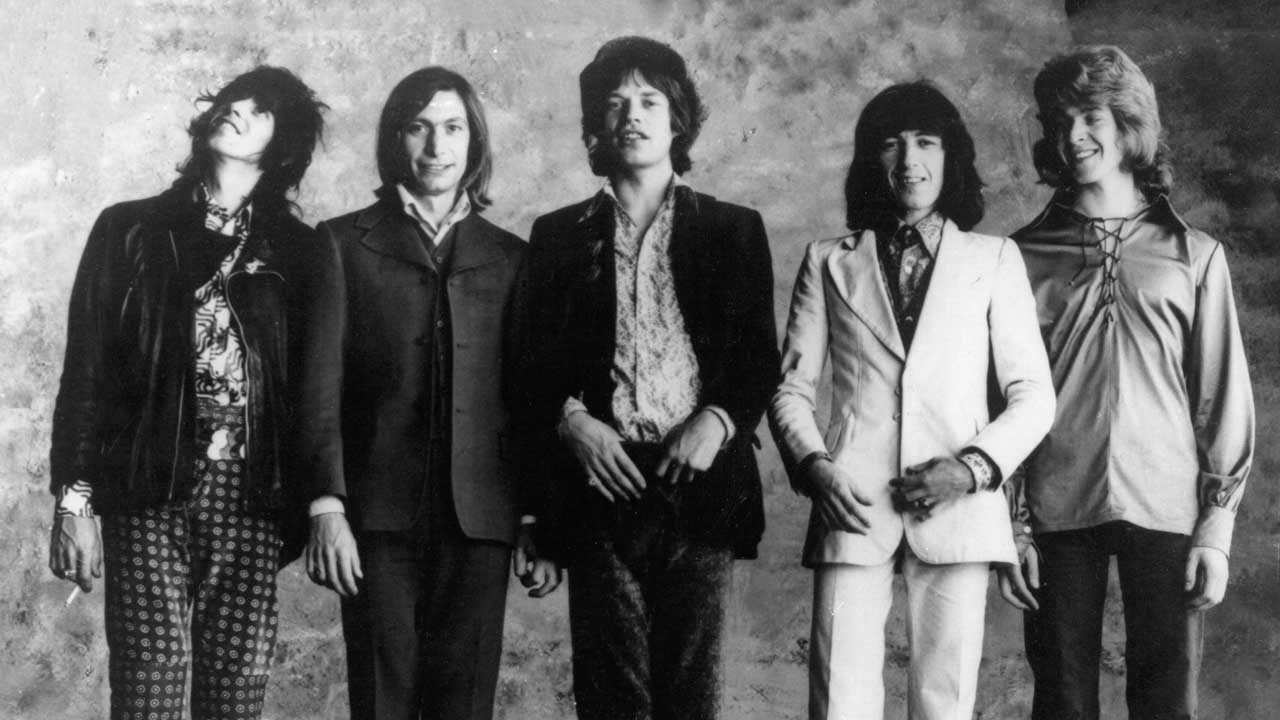
From its engaging opening Keith Richards riff, oscillating seductively through a Leslie speaker, Let It Loose stands out from much of its looser accompanying material, nestled down deep into side three of the Rolling Stones’ dissolute double-vinyl masterpiece from 1972, Exile On Main St.
The scene is set for one of the Stones’ most satisfying forays into gospel-tinged Americana by the prevailing mood of its predecessor. I Just Want To See His Face, a swamp-bluesy southern jam that transports the listener straight to church – despite mirroring the sound and feel of an audio vérité field recording of a revival meeting – was actually laid down at London’s Olympic Studios in 1970 by Mick Jagger on electric piano, Mick Taylor on electric bass, Bill Plummer on upright bass, Charlie Watts on drums and Jimmy Miller on percussion.
Two years later, as Jagger finally came to add improvised and impassioned testifying lead vocals in Hollywood’s Sunset Sound, he accentuated the existing vibe by enlisting Phil Spector session veteran Clydie King and ex-Ikette Venetta Fields to provide backing-vocal authenticity. Consequently, at See His Face’s conclusion the listener has been comfortably settled in their virtual pew, primed and ready for the main event. And Let It Loose doesn’t disappoint.
For such a significant song, its origins are sketchy: “I think Keith wrote that,” Jagger has said, calling it “a very weird, difficult song. I had a whole other set of lyrics to it, but they got lost by the wayside. I don’t think that song has any semblance of meaning. It’s one of those rambling songs. I didn’t really understand what it was about, after the event.”
And Keith’s reaction to that? “I would never take Mick’s recollection of anything seriously,” he says.
Despite the fact that the Stones embarked on the album that was to become Exile On Main St with just rough outlines of a handful of existing songs – the triumphant Shine A Light dated as far back as early ’68, during Brian Jones’s tenure with the band, when it started life as (Can’t Seem) To Get A Line On You, a comment on their disintegrating guitarist’s descent into debilitating drug dependency – the lion’s share of the album’s material was worked up in the basement at Nellcôte, Keith Richards’s recently rented home in Villefranche-sur-Mer in France.
“It was called Exile because we were basically booted out of England,” Keith remembers. A combination of police harassment and a draconian UK tax system hastened the band’s relocation to France,
“It was that or go and sweep streets,” Keith overstates casually. “I’d say about ninety per cent of Exile was done in that damn basement, which turned out to be a double album. We didn’t go in there and say: ‘We’re going to shove it to them and give them two in one’, we just worked. There was a certain esprit de corps: ‘If we’re going to do this, we’d better come up with something to show the bastards.’ It also made a lie of the whole ‘An Englishman’s home is his castle’. Yeah? Well, mine’s in France, pal.”
The original instrumental track of Let It Loose originated from these sprawling Nellcôte basement sessions of October ’71. Schizophrenically rooted in a bluesy combination of the keys D and G, its initial incarnation finds Keith channelling Pops Staples-style hammerons against Nicky Hopkins’s Mellotron, a sedate, locked-down Watts-’n’-Wyman rhythmic groove, and horn parts from Bobby Keys (sax) and ex-Delaney and Jim Price (trumpet and trombone). An ill-thought Mick Taylor slide overdub never made it to Exile vinyl, following the song’s eventual completion at LA’s Sunset Sound Recorders between December ’71 and March ’72.
Expanding on the ensemble gospel vocal parts of I Just Wanna See His Face, Let It Loose utilised a virtual choir of extraordinary singers. This time Clydie King and Venetta Fields were joined by Tamiya ‘Tami’ Lynn (who’d just enjoyed a runaway Northern Soul crossover UK hit with I’m Gonna Run Away From You), Shirley Goodman (formerly of Shirley and Lee, who’d released a smash version of Let The Good Times Roll in ’56 and would latterly enjoy disco stardom with Shame, Shame, Shame as Shirley & Company), soprano session veteran Joe Greene, familiar to the band thanks to his work with Billy Preston, and redoubtable New Orleans legend Dr John, who also supplied some characteristic, complementary piano.
But when it comes down to it, the true star of Let It Loose is Mick Jagger, who delivers one of his finest vocal performances. Sensitive yet strident, considered yet impassioned, it’s a defining example of Jagger’s distinctly stylised, instantly recognisable, yet ludicrously underrated, modus operandi.
From its opening sweet soul seduction, through its heart-bursting mid-section crescendo that builds relentlessly – and restlessly, thanks to Richards’s itchy-and-edgy arpeggiated guitar – toward a climactic choral coda that seals its inarguable status as a gilt-edged Stones classic. Its lyric doesn’t exactly equate to poetry, profundity may not be the song’s strong suit, but Jagger sells each syllable with such convincing commitment that ‘Let it all come down’ almost seems to acquire an gravitas equal to “I have a dream…”
Yet Let It Loose’s intrinsic magic lies in its feel. Its indeterminate whole transcends the sum of its parts, be they ‘bedroom blues’, five exiled undesirables in a basement surfing on the crest of a wave of bourbon, Texan horns or a gospel choir.
Let It Loose is the unmistakable sound of a band at the peak of their game and utterly infused with Americana. “Exile was what we learnt playing America for ten years,” says Keith. “Learning at first-hand what we’d only learnt before from records. Just soaking up American culture. And realising that, you know, they love an Englishman... (a wink, a clink). If you play it right.”







